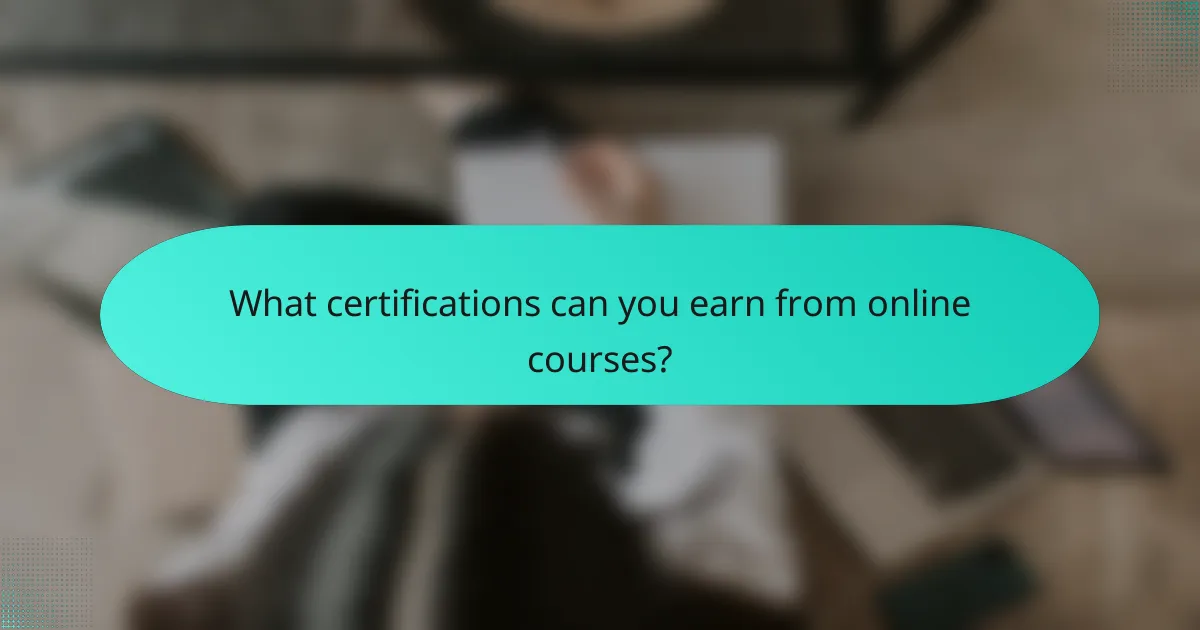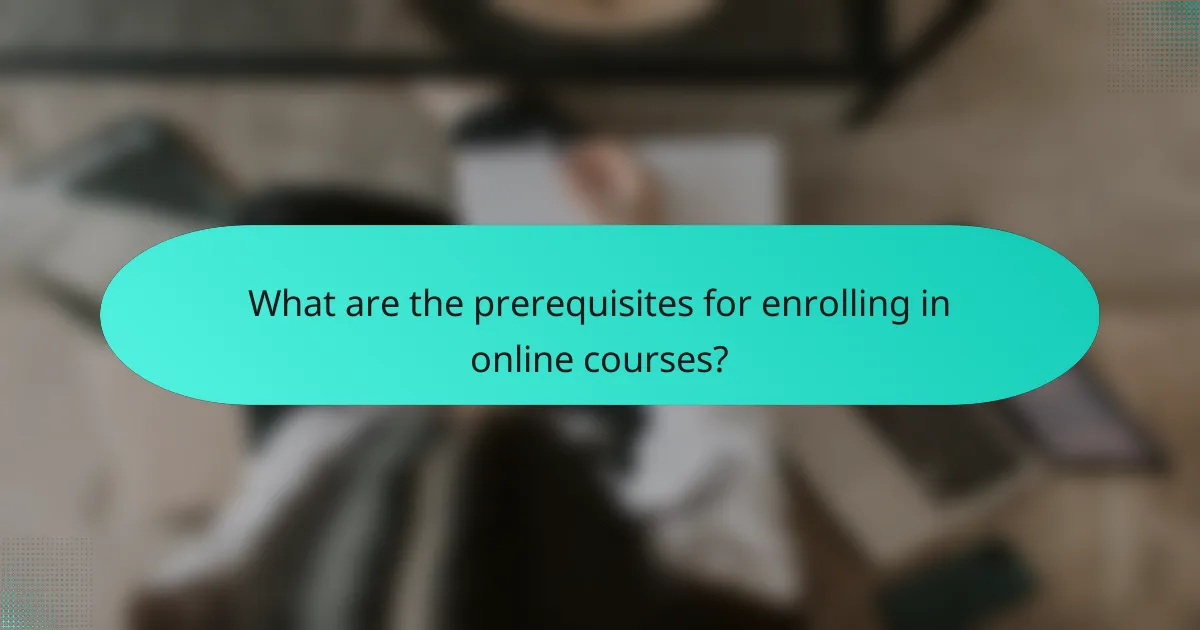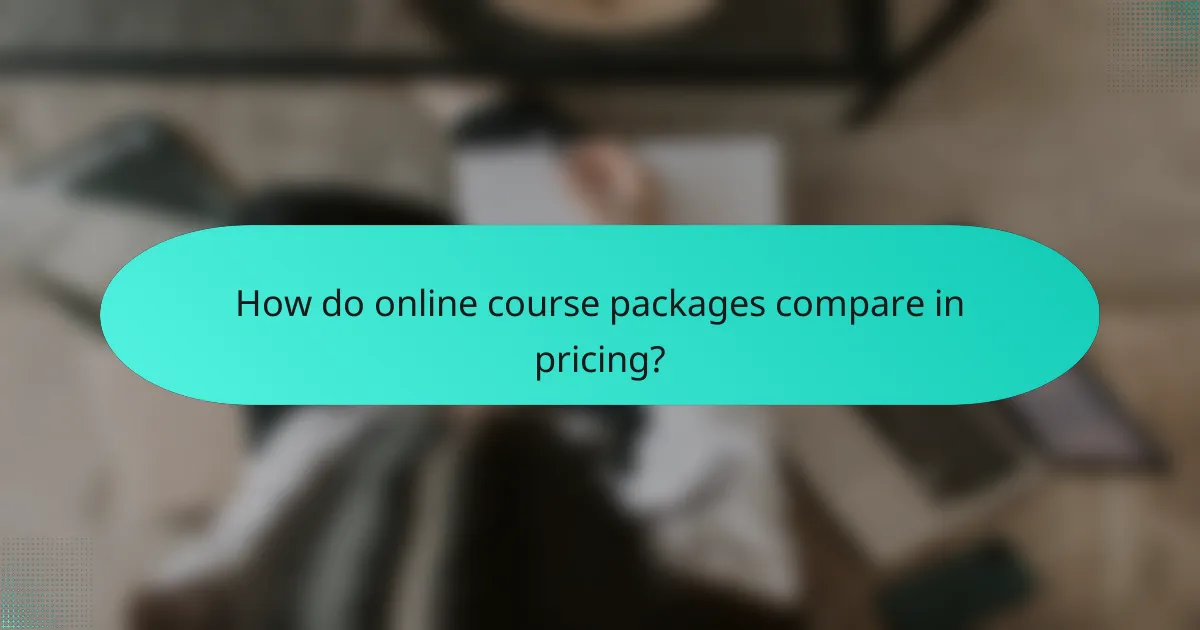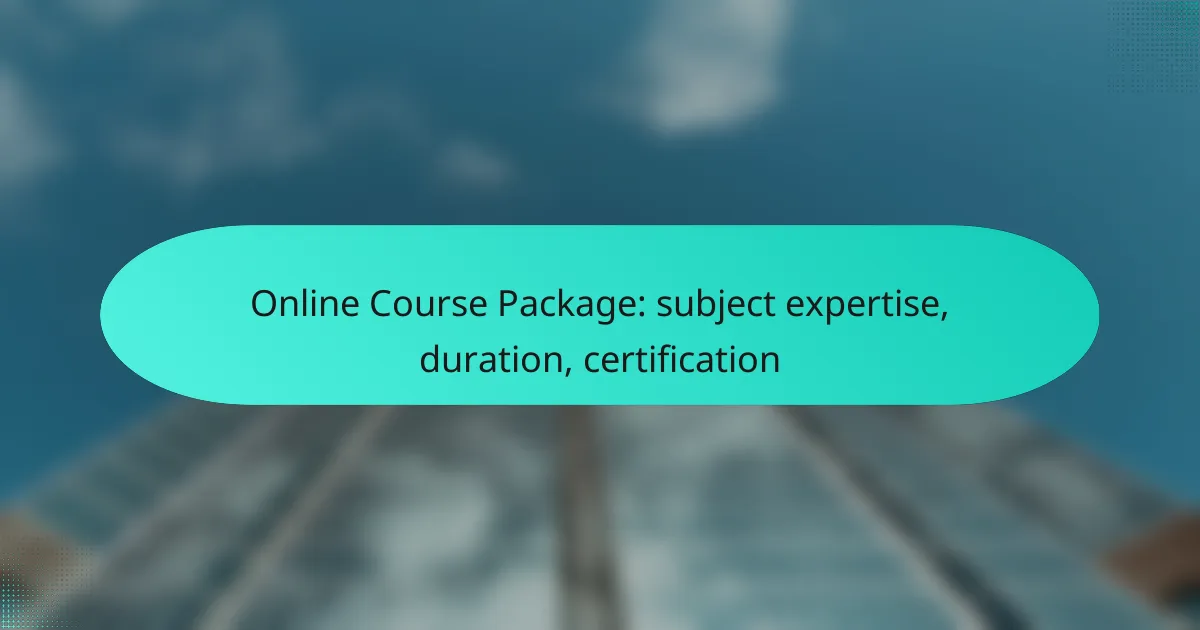Online course packages in the UK provide structured learning paths across a range of subjects, ensuring that learners can acquire the expertise needed for their professional goals. Typically lasting between 4 to 12 weeks, these courses offer recognized certifications that enhance your credentials and appeal to various industries. Popular platforms like Coursera, edX, and Udacity cater to diverse learning preferences and career aspirations.

What are the best online course packages in the UK?
The best online course packages in the UK offer structured learning paths, recognized certifications, and a variety of subjects tailored to industry needs. Popular platforms include Coursera, edX, and Udacity, each providing unique programs that cater to different professional goals and learning preferences.
Coursera Professional Certificates
Coursera’s Professional Certificates are designed to help learners gain job-ready skills in specific fields. These programs typically last from a few months to a year and include hands-on projects and assessments to reinforce learning.
Courses cover a range of subjects, including data science, business, and IT. Upon completion, participants receive a certificate that is recognized by employers, enhancing their job prospects.
When considering a Coursera Professional Certificate, check for financial aid options if cost is a concern, as many courses are priced in the low hundreds of GBP.
edX MicroMasters Programs
edX MicroMasters Programs provide advanced, graduate-level courses that can be completed online. These programs usually take six months to a year and consist of a series of graduate-level courses from top universities.
MicroMasters credentials can often be credited towards a full master’s degree, making them a valuable investment for those looking to further their education. Subjects range from artificial intelligence to project management.
Keep in mind that while some courses are free to audit, obtaining a verified certificate typically costs several hundred GBP. Ensure you understand the commitment required before enrolling.
Udacity Nanodegree Programs
Udacity’s Nanodegree Programs focus on tech skills, particularly in areas like programming, data analysis, and artificial intelligence. These programs generally last from three to six months and include personalized feedback from industry professionals.
Each Nanodegree is project-based, allowing learners to build a portfolio that showcases their skills to potential employers. The cost for these programs usually falls within the low to mid hundreds of GBP.
Before enrolling, consider your career goals and the specific skills you wish to acquire, as this will help you choose the most relevant Nanodegree for your needs.

How long do online course packages typically last?
Online course packages usually last between 4 to 12 weeks, depending on the subject and the provider. The duration can vary significantly based on the complexity of the material and the learning format chosen by the student.
4 to 12 weeks for most courses
Most online courses are designed to be completed within a timeframe of 4 to 12 weeks. This duration allows students to engage with the content at a manageable pace while still achieving a comprehensive understanding of the subject matter.
For example, a basic course in digital marketing might take around 6 weeks, while a more advanced course in data science could extend to 12 weeks. When selecting a course, consider how the duration aligns with your personal schedule and learning goals.
Self-paced options available
Many online course packages offer self-paced learning options, allowing students to progress through the material at their own speed. This flexibility can be particularly beneficial for those balancing work or family commitments.
Self-paced courses often provide access to all course materials upfront, enabling learners to complete modules as quickly or slowly as they prefer. However, it’s essential to stay disciplined and set personal deadlines to ensure timely completion.

What certifications can you earn from online courses?
Online courses offer various certifications that can enhance your professional credentials. These certifications can range from industry-recognized certificates to university-issued credentials, each serving different purposes and audiences.
Industry-recognized certificates
Industry-recognized certificates are awarded by professional organizations or companies and are designed to validate specific skills and knowledge in a particular field. These certifications are often highly regarded by employers and can significantly improve job prospects.
Examples include certifications from platforms like CompTIA for IT professionals or Google for digital marketing. Typically, these courses can be completed in a few weeks to a few months, depending on the complexity of the subject matter.
When pursuing these certificates, ensure they align with your career goals and are recognized in your industry. Look for reviews and endorsements from professionals in your field to gauge their value.
University-issued credentials
University-issued credentials are formal qualifications awarded by accredited educational institutions. These can include certificates, diplomas, or even micro-credentials that signify completion of a specific course or program.
These programs often take longer to complete, ranging from several months to a year, and may require more rigorous coursework. They can provide a deeper understanding of the subject and are often viewed as more prestigious than industry certificates.
When considering a university-issued credential, check the institution’s accreditation status and the program’s relevance to your career aspirations. Many universities now offer online options, making it easier to balance studies with work commitments.

What are the prerequisites for enrolling in online courses?
Prerequisites for enrolling in online courses typically include basic computer skills and, in some cases, subject-specific knowledge. Understanding these requirements can help ensure a smooth learning experience.
Basic computer skills required
Most online courses require participants to have basic computer skills, such as proficiency in using a web browser, navigating online platforms, and managing files. Familiarity with email communication is also essential for receiving course updates and interacting with instructors.
Additionally, students should be comfortable using word processing software and video conferencing tools, as many courses incorporate these technologies for assignments and discussions. If you’re unsure about your skills, consider taking a short online tutorial to boost your confidence.
Subject-specific knowledge may be needed
Some online courses may require prior knowledge in specific subjects to ensure that all participants are on a similar level. For instance, advanced courses in mathematics or science often expect students to have a foundational understanding of the subject matter.
Before enrolling, review the course description and prerequisites listed by the provider. If necessary, you can take introductory courses or self-study to build the required knowledge base. This preparation can enhance your learning experience and help you succeed in more advanced topics.

How do online course packages compare in pricing?
Online course packages vary significantly in pricing, influenced by factors such as subject expertise, course duration, and certification options. Generally, prices can range from low-cost offerings to more expensive, comprehensive programs.
Coursera pricing ranges from £30 to £300
On Coursera, course prices typically range from £30 to £300, depending on the course’s depth and the institution offering it. Many courses provide financial aid options, making them more accessible to a wider audience.
When selecting a course, consider what is included in the price. Some courses offer additional resources, such as graded assignments and peer feedback, which can enhance the learning experience. Look for courses that align with your career goals to ensure a worthwhile investment.
edX offers free courses with paid certificates
edX provides a unique model where many courses can be accessed for free, allowing learners to explore subjects without financial commitment. However, if you want a verified certificate upon completion, there is usually a fee involved, often ranging from £50 to £200.
This model allows learners to gauge their interest and understanding of a subject before deciding to pay for certification. Be mindful that while the content is free, the certification can add value to your resume, especially for professional development.

What are the benefits of online course packages?
Online course packages offer a range of advantages, including flexibility, access to expert knowledge, and often a recognized certification upon completion. These benefits make them an appealing option for learners looking to enhance their skills or knowledge without the constraints of traditional education.
Flexible learning schedules
One of the primary benefits of online course packages is the flexibility they provide in learning schedules. Students can choose when and where to study, allowing them to balance education with work or personal commitments. This adaptability is particularly beneficial for those with busy lifestyles or varying responsibilities.
Many online courses are self-paced, meaning learners can progress through the material at their own speed. This allows for a deeper understanding of complex topics, as students can take the time they need to master each section before moving on. However, it’s essential to set personal deadlines to maintain motivation and ensure timely completion.
Access to expert instructors
Online course packages often feature instruction from industry experts, providing learners with valuable insights and knowledge. Access to these instructors can enhance the learning experience, as students can benefit from their real-world experiences and practical applications of the subject matter.
Many platforms offer opportunities for interaction with instructors through Q&A sessions, discussion forums, or live webinars. This direct engagement can clarify complex topics and foster a sense of community among learners. However, it’s important to actively participate and ask questions to maximize this benefit.

What are the challenges of online learning?
Online learning presents several challenges, including the need for self-motivation, effective time management, and the potential for distractions. Students often struggle to maintain focus and discipline without the structure of a traditional classroom environment.
Self-discipline is essential
Self-discipline is crucial for success in online learning, as it directly impacts a student’s ability to stay on track with coursework. Without the physical presence of instructors and peers, learners must cultivate their own motivation to complete assignments and engage with materials.
To enhance self-discipline, set specific goals and create a structured schedule that mimics a traditional school day. Break tasks into manageable segments and allocate dedicated time for study, which can help maintain focus and accountability.
Common pitfalls include procrastination and overcommitting to distractions like social media. To counter this, consider using productivity techniques such as the Pomodoro Technique, where you work in focused bursts followed by short breaks, to improve concentration and efficiency.
